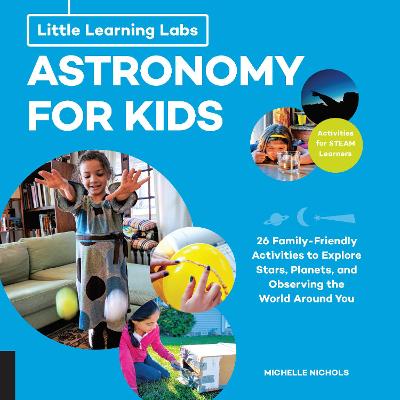Reviewed by annieb123 on
Astronomy Lab for Kids is a new reformatting and abridged re-release of Astronomy Lab for Kids (pub 2016) by Michelle Nichols. This abridged version is 80 pages and available in ebook and paperback formats.
I'm a huge fan of STEM education for everyone. In fact, the earlier we can introduce everyone to the limitless opportunities for growth, discovery, problem solving and coolness, the better off we'll all be. I'm therefore quite excited whenever I see science/tech books aimed specifically at young readers (and their caregivers). The author of this book is an experienced educator with a science background.
Although this book is generally aimed at kids, there are a lot of really neat labs which answer questions which would stump many adults (for example, why why are there so many craters on the moon, mom?!). The book's format presents learning units set up as safe lab exercises which can be done in a limited amount of time, with a limited number of household items and in a manner which is fun, engaging, and accessible.
The photography and text supplement and support the experiments very well. I like that the author gently introduces good lab protocol regarding safety and record-keeping (lab journals for the win!).
This is a good, appealing, and solid book, very well done.
Five stars
I do have one truly minuscule quibble with the book, and I feel nit-picky even writing this down. At the end, the experimenters pictured in the book (the children), get credit photos, and it struck me that the caucasian kids were over-represented. (Short explanatory apology. I went through university in an engineering program in the early 1980s and across all the disciplines, there were only a handful of girls/women. I spent my university years very isolated and alone (as well as being 3-4 years younger than my peers.) This book gets the gender ratio democratically correct at 50/50 boys/girls, but they seem to be mostly or all(?) white kids). It shouldn't matter, and it doesn't really matter, and I am sure that the editors and author considered this. It's also entirely possible that whatever selection criteria were used to find the participants was limited by the applicants or something.
Anyhow. STEM book for kids, and it's a good one.
Disclosure: I received an ARC at no cost from the author/publisher for review purposes
Reading updates
- Started reading
- Finished reading
- 6 October, 2018: Reviewed
